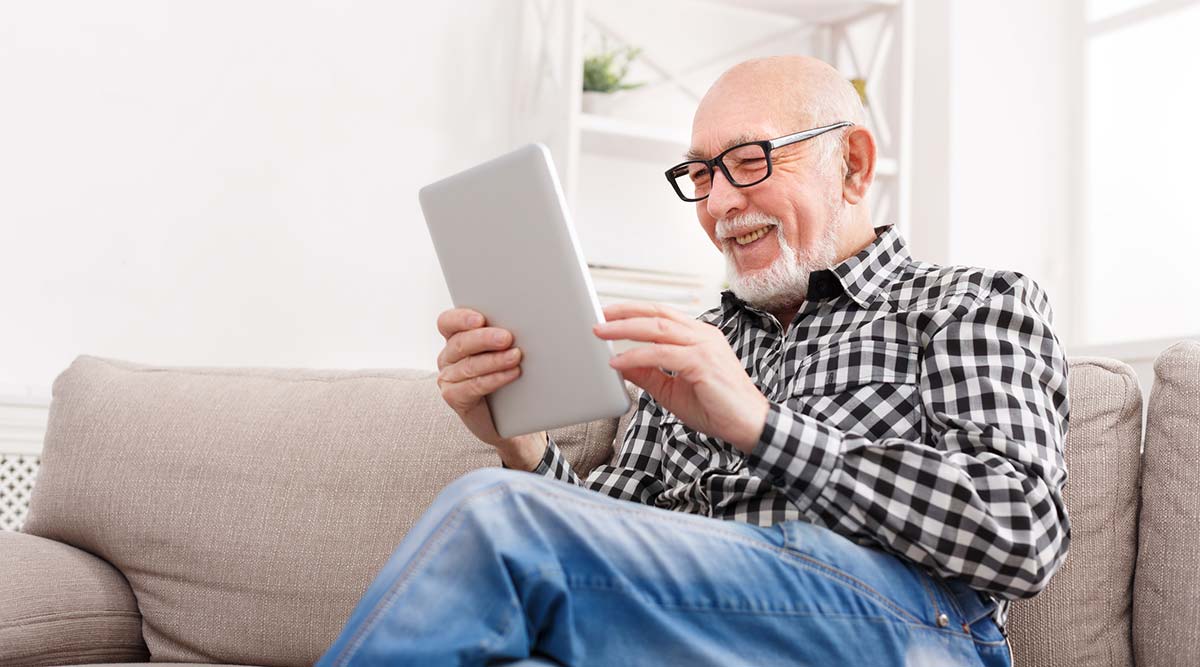When parents and grandparents age, little things can become more of a challenge.
Difficulties walking, seeing, and hearing can cause trouble on their own, but they can also create indirect issues. Personal care and cleanliness in the home can suffer, and this can in turn cause seniors to stay in more, socialize less, and possibly run into mood disorders like depression or seasonal affective disorder.
These times can be difficult for both seniors and their caregivers, including children, friends and other relatives. But with the aid of several new types of technology, seniors can become more independent and better equipped to handle challenges. For them and everyone in their inner circle, this is a boon to better functionality, a more stress-free lifestyle, and greater happiness.
Let’s take a look at the top eight new types of technology that can create great benefits for seniors and their caregivers.
1. Medication Management
Everyone knows that as we age, it becomes essential to take more medications. The good news is that with advancing health technology and innovation, these medications keep us alive, healthy, and well.
But handling new medications, how often to take them, and how much to take them, can be a hassle — not to mention handling prescription renewals, changes in dosages, and other challenges. Apps and online services, however, can offer assistance for these issues. Here are some that we recommend:
- RxmindMe
- Personal Caregiver
- CareZone
- Medminder
- Reminder Rosie
- TabSafe
- MedCoach
2. GPS Technology
Often, seniors with Alzheimer’s disease may leave their residence when no one else notices. Naturally, this can cause a huge scare, but GPS tracking devices such as AngelSense can keep track of these individuals so that they can be located quickly and easily. Another option is GPS SmartSole, which is actually a GPS device that can be hidden in a shoe insole.
3. Health Tracking Tools
Health tracking tools can assist seniors in taking care of both their physical and mental health. HealthVault is one option that has shown great promise among users.
This Microsoft service provides a super safe and secure place for you to store, manage, and gather important health information. Here, you can access medical records and track your health with smart watches, blood glucose monitors, activity trackers, blood pressure monitors, weight scales, and more. When necessary, you can share your data as well — for example, with loved ones or medical professionals.
4. Care Coordination Apps & Devices
When someone is experiencing difficulty managing a health issue or is in and out of the hospital, it can be difficult to juggle not only care, but information between friends and family members. An app like CaringBridge takes care of this.
While public social media accounts aren’t appropriate for sharing personal and medical details, a private service like CaringBridge offers a private and easy to use platform where health updates, messages and prayers, and caregiver information can be shared among loved ones.
5. Socialization
It’s important for seniors to socialize, and according to WebMD, regular socializing may even help everyone stay sharper for longer. When face-to-face socialization isn’t an option, however, or for those seniors who live alone — apps such as Skype and social media sites like Facebook or Instagram are recommended. Other technological options specifically designed for seniors include GrandCare and GeriJoy.
6. Online Forums & Support Communities
Often, family members and friends would like to offer a helping hand to their senior loved ones. What keeps them from doing so sometimes, is not knowing the detailsof these loved ones’ needs.
Lotsa Helping Hands makes things so much easier. With this service, friends and family members can form communities to quickly and easily schedule care, meals, and other support for senior loved ones. Everything is organized and easy to use, and your loved ones get the best free care and support possible.
7. Wireless Home Monitoring
Although it’s certainly good for many seniors to remain independent, problems can abound in these situations — especially those that may be caused when an independent senior falls or is somehow incapacitated and can’t reach out for help.
The ideal solution is sensor-based monitoring. GrandCare offers a suite of technologies for seniors, including activity monitors that keep an eye on the daily activities of seniors living alone without sacrificing their privacy or independence. Another option is PERS (Personal Emergency Response System), which acts as an on-person monitor when seniors need assistance after a fall, for example.
8. Telikin Computer
Lastly, we have Telikin, which is a super simple and easy-to-use computer — especially designed for senior use. Like any computer, it includes capabilities for video chat, looking at and sharing photos, games, web browsing, email, and much more, but without the learning curve of normal PCs. Each computer can also support multiple users, so these devices are great for senior centers and retirement communities as well.
Whether you’re looking for ways to help an elderly parent or someone with early-onset Alzheimer’s, these areas of technological innovation are a step in the right direction. While some of the technologies may take some getting used to at the start, we recommend making a concerted effort to push through the smaller challenges — for the benefits these technologies could help you make great strides at improving your quality of life or the quality of life of your loved one.

